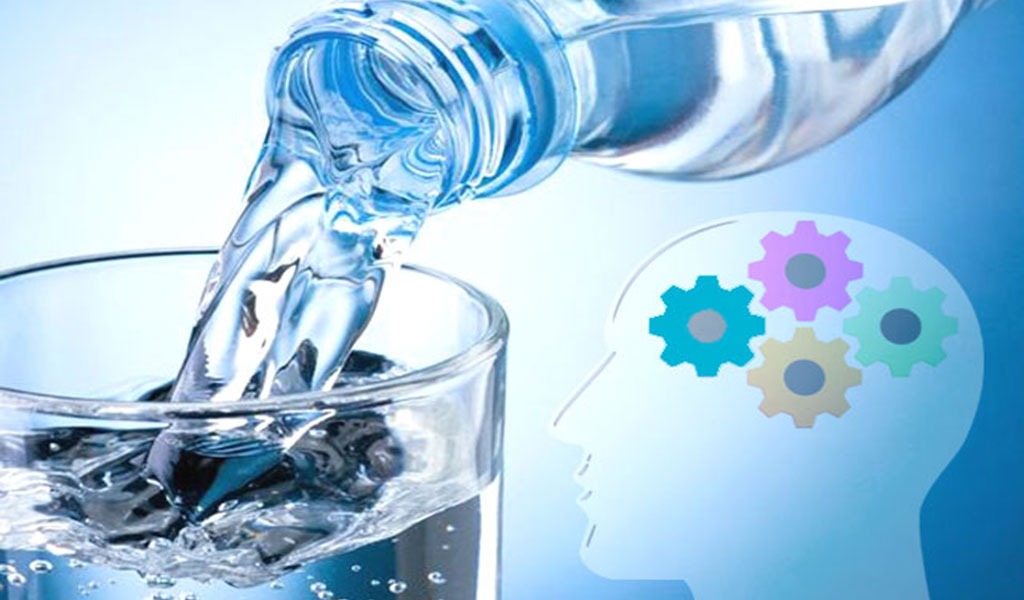
Our brain also needs fluids to function properly. But how many liters of fluid does our brain actually need per day? This is where the information sometimes diverges. Surely everyone has heard that the human body consists of 60% water. What few people know, however, is that the brain is the organ with the most water in the whole body. It consists of 75% water. This explains why a lack of fluids has such a significant effect on the brain.
Prof. Dr. Ulrich Ettinger from the Institute of Psychology, University of Bonn, states the following in a study:
The brain reacts to the amount you drink
Our brain actually reacts to the amount we drink. He analyzed this in his study with 16-17-year-olds. The young people had to wear an airtight military NBC suit and were then placed on an exercise bike. They had to train on it for a total of 70 minutes. Although the fitness machine was set to “light”, the plastic suit meant that the exercise was strenuous for the graduates. On average, they sweated out around 1.5 liters of fluid and became dehydrated as a result.
In this state, they were connected to a functional magnetic resonance imaging (fMRI) scanner and had to play a computer game. The planning capability was tested. However, the ability to think was not impaired by the dehydration med.: Volumenmangel der extrazellulären Flüssigkeit, u.a. des Blutplasmas – dem Körper wird weniger Flüssigkeit zugef.... What was striking, however, was that brain activity in the cortex showed significantly increased neuronal activity in three areas.
What was thus established is that the brains have to work harder in a dehydrated state in order to achieve the same performance as without a lack of water. This can be dangerous because we only have limited neuronal and cognitive reserves. If our brain has to work harder than usual, it may not have enough energy for additional tasks.
Lack of water hits the mood
We also know from studies by fellow researchers that dehydration has an effect on mood. Thirsty people find cognitively demanding tasks particularly difficult: they have difficulty concentrating, they get tired but are tense at the same time. If there is a major water shortage, cognitive performance also drops significantly.
This means that a person who needs to concentrate should pay attention to their body. He should drink a glass of liquid even before he feels thirsty. Nutritional physiologists recommend that men should drink 2.5 liters of fluid a day, compared to 2 liters for women. We should therefore drink enough. This is not only important for a well-functioning body, but also for a fit and quick mind.
It is best to drink a glass of water every hour or every 45 minutes to keep the brain working efficiently. We often drink water in the belief that it is of the utmost importance for the kidneys and liver or even the heart. This is true, but the brain must not be forgotten either: It is the body organ that requires the most energy. Around 75% of the brain is made up of water, which is essential for the proper functioning of our brain.
To summarize:
1. the brain works faster
The brain is directly dependent on an adequate supply of water, as this is the only way it can function efficiently. The brain cells need a balanced water balance and nutrients in order to perform their functions properly.
In the morning, the brain cells need to be supplied with water in order to be able to function properly again.
After 7 to 9 hours of sleep, the body has lost fluids during the night, even if you haven’t sweated.
Every time you breathe, moisture is expelled, which is why the water balance urgently needs to be restored in the morning.
2. better ability to concentrate
We are usually not aware that the body needs water. Only in extreme cases does dizziness or dry skin occur, but these are already alarm signals. The brain is the first to suffer from a lack of water. The consequences are a weaker ability to pay attention, fewer resources, a poorer working memory and difficulty concentrating. The reaction time to stimuli is also slower.
3. balancing the state of mind and emotions
The temperature in the brain is regulated by the intake of water. Harmful substances and dead cells are removed and chemical processes are balanced. This is a kind of “mental reset” in the brain.
As mentioned above, it is important to keep the body hydrated with a few sips of water to keep the cells active and to create an inner balance that also helps to regulate stress and nervousness.
4. water improves sleep
Water promotes blood flow to the brain, improves the oxygen supply, supplies the brain with fluid and ensures rest – even at night. It is therefore advisable to have a bottle of water next to your bed at night.
5. memory improves if you drink water regularly during the day
Even a slight lack of water can cause homeostatic processes to become unbalanced. This means that it can lead to disorders that affect areas essential for survival. The consequences include reduced cognitive capacity: it is more difficult to remember things, process information, draw conclusions, store something in memory for the long term…
I’m sure many people know the feeling. Somehow you hardly drank anything throughout the day – you didn’t have time for it or you weren’t thirsty. In the evening, you’re incredibly exhausted, your head hurts and you can hardly concentrate on a simple conversation. The body and brain are dehydrated. Water was removed from the body’s cells and blood. Every cell in the body is thirsty. As a result, your muscle cells and the so-called small, gray cells in the brain are no longer supplied with sufficient oxygen and nutrients. Thinking performance decreases significantly. Concentration becomes almost impossible.
So if we hardly hydrate our body during the course of the day, a loss of two percent of our body fluid is quickly reached. And once you understand this, you’ll also understand why experts recommend drinking so many liters a day. The fluid that is lost through the body’s natural processes is replenished immediately.
In any case, we should always be aware of what happens to our brain when we don’t drink enough. So it’s best to adopt fixed drinking rituals that remind you again and again how important drinking is. And every sip of water is good for your brain.
